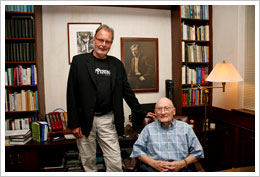Visiting professor from Denmark:
The Centenary-Aarhus connection
By Dr. Earle Labor
George A. Wilson Chair of American Literature

Visiting Professor Per Serritslev Petersen (left) and Dr. Earl Labor. Professor Petersen spent the last semester teaching classes at Centenary so that Dr. Labor could continue work on his biography of Jack London.
—Photo by Donna Bartholomew
In 1973, I was exceptionally fortunate to be awarded a Fulbright Professorship to Aarhus University in Denmark. This was described by the Fulbright official who phoned me as a "blue-ribbon appointment."
My subsequent experience there confirmed his description. I have often said that this was the best year of our family life. My three youngest children—ages 10 through 14—all attended public school near our apartment, and all learned to speak Danish fluently. Our oldest son, Royce, a Centenary student, joined us later. At no time did any of us ever feel like "aliens." I could talk for many hours about the attractive characteristics of the Danish people.
My academic experience was equally gratifying. In fact, at the request of CONGLOMERATE Editor John Hardt (now Academic Vice President at Brevard College), I sent back a series of newspaper articles titled "Fulbright Follies," detailing our year in Denmark along with my work in the classroom. By the way, I might mention that the enrollment in the English Department there equaled the total student body at Centenary. In other words, Aarhus U. is a major European University with a number of internationally known scholars, one of whom is featured in this article.
So happy was our Danish year that I told my wife Betty, "This is too good not to share!" Consequently, when we returned home, I worked with our administration and the Aarhus English Department to establish an exchange program not only for students but also for professors. If not unique, our program is certainly unusual. You may check with April Valentine to be sure that the same guidelines are still in effect: our students and the Danish students exchange without paying any additional fees.
Our professors have exchanged houses and automobiles, thereby minimizing expenses. Lee Morgan was the first Centenary professor to enjoy the Danish experience. There have been several others since then, including Jeff Hendricks and David Havird.
Last May, I revisited Aarhus, along with Milo Shepard, Jack London's great-nephew and donor of the memorabilia in the Peters Building, my son Kirk Labor and one of his fellow physicians. The highlight of that visit was a reunion with my old friends and colleagues from the university, who surprised me with a letter from the Director of the University commending me on my "untiring contribution to international understanding and scholarly cooperation."
Among those friends was Per Serritslev Petersen, recently retired after chairing the Aarhus English Department for 20 years. Professor Petersen is a scholar with international reputation who has published widely both in Danish and in English, including some outstanding essays on Jack London. He was a participant in the Centenary/Aarhus Program in 1984.
"How are you coming along on your London biography?" he asked me during our dinner conversation.
"I finished my rough draft last summer but haven't had time to smooth it out yet," I replied.
"The World of Jack London is waiting for that book," he said. "I tell you what I'll do: I'm retired now. I'll come and teach your courses so that you can finish that book."
It was an extraordinary gesture of friendship. Beyond this, it was a tribute not only to my work but also to Centenary because of the happy experience he had enjoyed on our campus as an exchange professor.
At first I hesitated, thinking I could wrap up my project this past summer—but when school started last fall, the end was still not in sight. So I wrote, asking if he were still interested and willing. He replied that he was indeed, and he has been here this current semester teaching my courses as I have worked toward completing my biography.
Offhand I can think of no comparable arrangement in the history of academia.
(NOTE: Dr. Labor is an internationally renowned London scholar who has more than 80 scholarly articles and reviews, as well as 12 books, to his credit. He is also the official biographer of novelist Jack London, and is curator of the Jack London Museum at Centenary College.)
